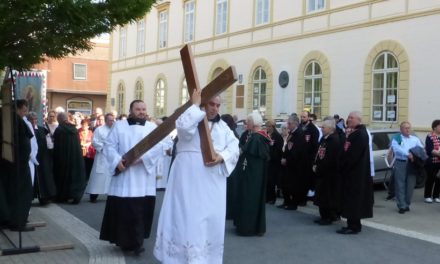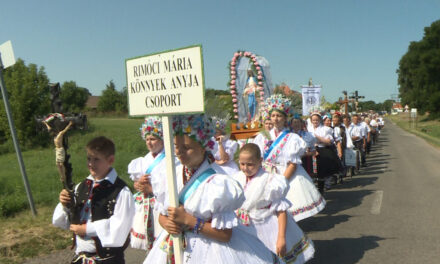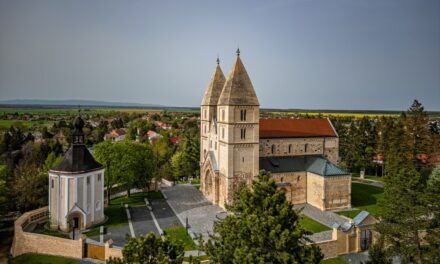If God prepares for us a moment in which realizations lie, then we should grab it with both hands and not let it pass, because such a moment may not be given again. Written by János Révész.
"You would have no power over me if it had not been given to you from above" ( John 19:11 ).
For me, the fasting period is an opportunity to recognize the possibility of a great encounter with Jesus Christ in the story of his suffering. Most people want to erase suffering from their lives: they run away from it, or they look for some kind of miracle drug, a quick "medicine" against it. After all, we live in the hours of the deepest suffering, not to do, but simply to be, as the best possible self!
"Now I don't do anything, I just let God love me. And while the light embraces me, and the silence embraces me, and it flows into me and I am reborn, while I do nothing, I just let God love me"
– we can quote Erzsébet Túrmezei. It is a great help if we find someone who helps us to find our own inner resources, who gives us hope to discover and find meaning and purpose in the experience of suffering, illness and pain: "who has a "why" for almost everything »how« it endures" (F. Nietsche).
The suffering story of Jesus has a line that can be formulated as follows: face-to-face encounters.
The Father gave Jesus to the world so that when we meet Him, we can come clean with who we are and where we stand in one fell swoop. This is what happened when the mocked, mocked Jesus looked back at Peter and their eyes met. Peter saw himself in the gentle eyes of Jesus, in his painful gaze, completely different than before. Such a face-to-face encounter is also when Jesus is questioned by the high priest and one of his servants hits him in the face. No one orders the overzealous servant to order, which means that basically everyone agrees with what he is doing. The high priest, the supreme spiritual leader, uses direct physical violence and finds himself confronted with the gentleness of Jesus.
You might think about that. Here, the suffering Right stands before him, as the prophet Isaiah wrote, what a truly Israelite is like: in the minority, unarmed, he represents the truth as a suffering servant of the Lord. This is what the children of God should be, because the word Israelite means: "Warrior of God", "Fighter for God": one who fights the struggle of the earthly man in order to know at all what it means to be a child of God. The Old Testament is about this kind of Judaism, this spiritual mission, not worldly power.
The high priest is thus facing the suffering Truth, and he might realize that he himself should follow this path. But he misses the moment and has no more options.
Pilate also meets Jesus face to face, and he could also meet himself. But at the big moment, at the decisive moment of his life, he remains in his role: he is a prosecutor, a local representative of world power, a governor. We all have qualified moments in our lives when many things are decided, for years, decades, and even for eternity. The real process and drama of our lives does not take place in a vacuum, but in the course of the events that surround us. Our circumstances are givens, some of which can be controlled, that is, they offer opportunities for shaping and changing. Our poignant and painful knowledge is that people heal and people destroy. We humans affect each other like sun and frost affect a green field.
If we think about it, in the mentioned story, in all three encounters, something vertical, something vertical happens. Something where heaven meets earth. But as long as Peter is shaken by this encounter and his life is renewed, the high priest and Pilate close their hearts, everything remains the same in their lives. Here is the missed moment of grace, the misunderstood, missed, wasted opportunity. Without a mirror, we cannot know what we are like, we need the eyes of others to see ourselves. Of course, this requires insight.
"Even if you bathe in yourself, you can only wash your face in someone else. Be the little edge on a blade of grass, and you will be bigger than the sea of the world" (Attila József).
We are all familiar with situations and people who refuse to meet for real. Yet meeting is the essence of our life, the school of life is not limited to ourselves. The adult personality, the human being capable of choice and decision, is not the one who no longer needs the other person, but the one who is able to pay attention to the other person and gift him with the accumulated experiences of his encounters. An example of this is the life of those people who, in the concentration camps, did not care about their own salvation, but that of their companions, and were ready for the most wonderful devotion in love for the other person, ready to listen and speak honestly.
Therefore, the decisive and central message of our speech reads as follows:
"Today, if you hear his word, do not harden your hearts!" (Hebrews 3:15)
What we could also say: if God prepares for us a moment in which realizations lie, then we should grab it with both hands and not let it go, because such a moment may not be given again.
"Buy opportunity even at a price, because the days are evil"
– we read in the Károli translation (Eph 5:16).
Pilate had no other sin than to remain who he was. This is a sin: a state, that we have fallen out of God's presence and are having a good time. Status: ungodliness, life without God.
Actions just follow. God offers everyone the opportunity to restore their lives.
"For the Son of Man came to seek and to save that which was lost." (Luke 19:10)
He came to save this lost one, he came for that, he gave his life so that we too might live. This setback begins when a person's life reaches unity and harmony with the living God.
The author is a missionary pastor of the Reformed telephone pastoral care service
Featured image source: velvidek.ma












